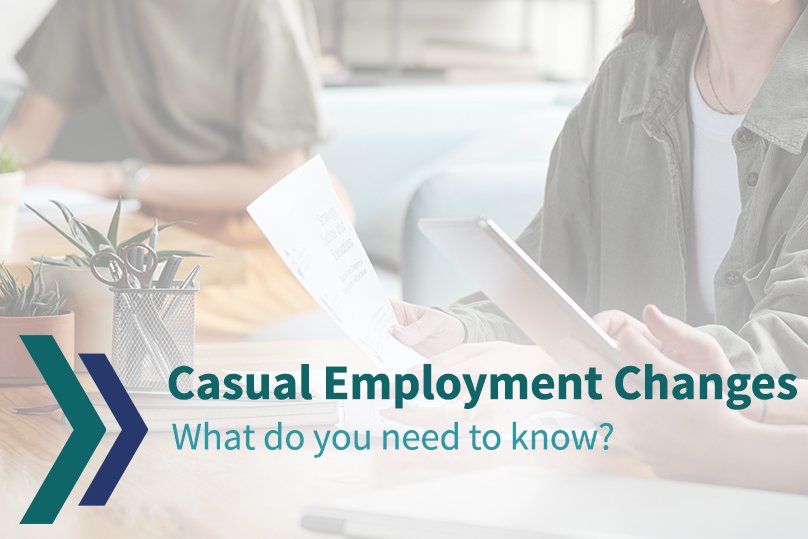Changes to Casual Employment
We recently provided an update that the Federal Government’s proposed Fair Work Amendment (Supporting Australia’s Jobs and Economic Recovery) Bill 2020 (the Bill) had passed both houses of Parliament in a significantly reduced form. The legislation, which received royal assent on 27 March, introduces a new definition of casual employment, as well as a right for eligible casual employees to convert to permanent employment in certain circumstances.
Please see our Q&A document which explores in more detail some of the questions that may arise from this new legislation. Please call us on 02 9189 5999 or contact enquiry@cer.catholic.org.au if you have any further questions.
Q&A
Definition of Casual Employment
What is the new Definition of Casual employment?
If a person is:
offered employment without a “firm advance commitment to continuing and indefinite work”; and
the person accepts that offer,
the person is a casual employee regardless of any changes in the employment relationship. The offer of employment is the determining factor, not any subsequent conduct of the parties.
What factors will determine whether there is no firm advance commitment to continuing and indefinite work?
can the employer elect to offer work and can the person elect to accept or reject work?
will the person work as required according to the needs of the employer?
is the employment described as casual employment?
will the person be entitled to a casual loading or a specific rate of pay for casual employees under the terms of the offer or a fair work instrument?
Casual Conversion
What assessment must an employer (other than a small business employer) make when a casual employee reaches 12 months of employment?
During at least the last 6 months of the 12-month period, has the employee worked a regular pattern of hours on an ongoing basis which without significant adjustment, the employee could continue to work as a full-time or part-time employee?
If the answer to this is “yes”, are there are reasonable grounds (see below) for the employer not to offer conversion based on facts that are known, or reasonably foreseeable, at the time of deciding not to make the offer?
If an employee is not eligible for conversion what do employers need to do?
If the employee has not worked a regular pattern of hours over the previous six months, the employer must provide them with a written notice advising that no offer will be made and the reason why.
This notice must be provided within 21 days after the employee completed 12 months of employment.
What must an employer do if the employee is eligible for conversion and there are no reasonable grounds not to offer conversion?
The employer must offer conversion (in writing) to the employee within 21 days after the employee completed 12 months of employment. CER will be making template letters available to members shortly.
What conversion must be offered?
If conversion is to be offered:
Full-time employment must be offered to casual employees who have worked full-time hours during the previous 6-month period.
Part-time employment must be offered to casual employees who have worked part-time hours during the previous 6-month period. The part-time employment offered must be consistent with the regular pattern of hours that the casual employee has worked during the 6-month period.
What happens after a conversion offer is made?
The employee must respond in writing within 21 days, advising whether they accept or decline the offer.
If the employee does not respond, it is taken that they have declined the offer.
If the employee accepts the offer, the employer must give written notice to the employee within 21 days advising:
whether the conversion is to full time or part time employment
if part time, what the hours of work will be
the date the conversion will take effect which is the commencement of the first full pay period after the date of the notice, unless otherwise agreed with the employee.
Before providing this notice, the employer must discuss these issues with the employee.
The employer should also issue a new employment contract outlining the new arrangements.
On what basis can an employer decide not to make an offer of conversion?
If the employee has not worked a pattern of hours that meets the conversion requirements or decides that there are reasonable grounds not to make an offer to the employee for conversion.
What would amount to reasonable business grounds?
The reasonable grounds are based on facts that are known, or reasonably foreseeable, at the time of deciding not to make the offer and include:
where the employee’s position will cease to exist in the 12 months after the conversion right arises;
where the hours of work which the employee is required to perform will be significantly reduced in the 12 months after the conversion right arises; and
if there will be a significant change in either the days or times on which the employee’s hours of work are required to be performed in the 12 months after the conversion right arises which cannot be accommodated within the days or times the employee is available to work during that period.
What if conversion is not offered?
The employer must give written notice of this decision to the employee within 21 days after the employee completed 12 months of employment.
The notice needs to provide the grounds on which the employer has decided to not make an offer.
Is an employer required to offer conversion every 12 months?
No. After an eligible casual employee’s initial conversion right at 12 months of employment, an eligible employee has the right to request conversion at a later stage (residual right) but not if they have requested conversion within the last six months.
In this instance the onus will be on the employee to make a request if they wish to exercise a residual right to request conversion.
Are there transitional arrangements in the legislation?
Yes. Following the commencement of the legislation there will be a 6-month transition period ending on 27 September 2021.
What must Employers do by the end of the transition period?
For all casual employees who started their employment prior to commencement of the legislation, an employer (other than a ‘small business employer’) must assess each casual employee against the conversion criteria and either:
offer conversion to eligible casual employees (unless the employer has reasonable grounds not to); or
provide a notice to each casual employee who is not offered conversion including the reasons why the employer has not made an offer.
CER will be making template letters available to members shortly.
What if an employee chooses not to convert to permanent employment?
The employee can remain a casual employee indefinitely. After an eligible casual employee’s initial conversion right, the employee has the right to request conversion at a later stage but not if they have requested conversion within the last six months.
What if an employee has recently been offered conversion through the terms of a modern award or enterprise agreement?
The obligations in the legislation apply regardless of whether a casual employee has already recently been offered conversion through the terms of a modern award or enterprise agreement.
Interaction with Industrial Instruments/contracts of employment
How do the changes interact with provisions in enterprise agreements?
The National Employment Standards (NES) overrides enterprise agreement provisions that are less generous to employees, but not agreement provisions that are more generous to employees. The Fair Work Commission (FWC) will have the power to resolve uncertainties and difficulties about the interaction between an enterprise agreement and the definition of a ‘casual employee’ and casual conversion rights in the NES. The FWC may make a determination varying an enterprise agreement on application by an employer, employee or union covered by the enterprise agreement.
How do the changes interact with provisions in modern awards?
Most modern awards define a casual employee as ‘one engaged and paid as such’ and include provisions which give eligible employees the right to request conversion after a specified qualifying period of 6 or 12 months, with employers having the right to reject conversion requests on reasonable grounds.
The NES overrides award provisions that are less generous to employees, but not award provisions that are more generous to employees.
Within a six-month period from commencement the FWC must review the casual employment terms in all awards to ensure consistency with the amended NES.
Will our casual employment contracts need to be reviewed or amended?
It is recommended employers ensure that employment contracts for casual employees clearly state:
the offer is for employment as a casual employee;
the offer is made on the basis that the employer makes no firm advance commitment to continuing and indefinite work according to an agreed pattern of work for the person;
the employer can elect to offer work and that the employee can elect to accept or reject work;
the employee will work as required according to the needs of the employer; and
the amount of the casual loading or specific casual rate of pay.
Right to Offset Entitlements
What is the right to offset entitlements under the legislation?
In circumstances in which an employee is found to have been incorrectly engaged as a casual (that is, they are deemed to be a permanent employee), there is an express right for employers to offset any leave entitlements owed to the employee against the casual loading paid. To benefit from this Employers should ensure that the relevant entitlements the loading is compensating for are specified in the employment contract and/or relevant industrial instrument.
It should be noted that service as a casual employee is not counted for the purposes of redundancy pay, notice of termination and various other entitlements of permanent employment if the casual converts to permanent employment.
Casual Employment Information Statement
What is the Casual Employment Information Statement?
The Fair Work Ombudsman (FWO) has published a Casual Employment Information Statement. This includes information about the definition of a ‘casual employee’ and the conversion rights of casual employees.
What are an employer’s obligations regarding the Casual Employment Information Statement?
The Statement must be given to each casual employee before, or as soon as practicable after, the employee starts employment as a casual employee. If the employer employs a casual employee more than once in a 12-month period, the employer is only required to give the casual employee the Statement once in the period.
Is an employee required to give the Casual Employment Information Statement to existing employees?
An employer (other than a ‘small business employer’ with less than 15 employees) must give each casual employee who started their employment before the amendments to the Fair Work Act commence, the Casual Employment Information Statement, as soon as practicable after the end of the transition period (27 September 2021). Small business employers are required to provide each casual employee with the Casual Employment Information Statement as soon as practicable after 27 March 2021.
Resolution of disputes
What happens if there is a dispute about the operation of the casual employment provisions?
If a dispute arises about the operation of the casual employment provisions such as whether an employee is eligible to convert to full-time or part-time employment, the dispute settlement clause in the relevant industrial instrument will apply. Otherwise, the Fair Work Commission can conciliate and, if all parties agree, it can arbitrate. In addition to the above, the Federal Circuit Court in the small claims jurisdiction is able to make orders relating to the eligibility of an employee to convert to permanent employment.
Penalties for breaching the legislation
What are the maximum penalties for breaches of the new provisions?
The maximum penalty for a body corporate which breaches the NES, including the casual employment provisions, is $66,600 per contravention or $666,000 for a ‘serious contravention’. The maximum penalty for an individual is $13,320 per contravention or $133,200 for a ‘serious contravention’. Casual employees are also protected against adverse action by an employer because they have a workplace right to convert to permanent employment.












